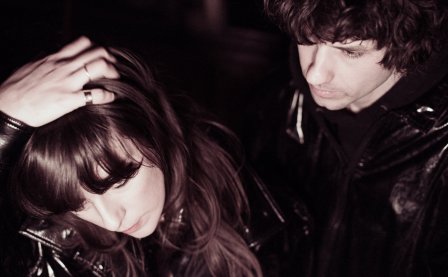It’s been argued — perhaps wishfully — that the philosophical obsession with language as a fundamental category will soon be swept away, cyclically, by a return to the issue of time. Plus ça change, plus c’est la même chose. Apropos of time, the central concept of Miranda July’s 2011 film The Future (apart from a cat who narrates from an ambiguous point somewhere beyond the grave) was the idea that the moment before a personal catastrophe could literally be suspended in time. And when Beach House’s “Master of None” came on during July’s parodic scene of YouTube performance anxiety, I felt like I’d been sucker-punched; that was a moment I could, myself, have chosen to suspend. This music has some emotional meaning to me, I thought — how can July cheapen it in this way? The realism of her character’s soundtrack choice, though, was more difficult to criticize.
Bloom represents an improvement on 2010’s slicker, overrated Teen Dream, but while using a similar palette to the group’s first two albums, it fails to enchant equally or to add anything to the sound developed there. In this sense, it too can be read as a suspension in time. I don’t mean to imply that to achieve greatness, a band must be in a process of constant change; many have forsaken a characteristic sound in the name of evolution, with the precise consequence of losing what they had of beauty and originality in the first place. Conversely, when a band’s sound is interesting and original, a string of albums based on the same paradigm can be a rich pleasure. And while the sound Beach House mined on their debut wore its influences on its sleeve, it was instantly recognizable as their own and could never have been accused of pastiche. With Bloom, then, three albums later, a Cronenbergian mutation of the pause (repetition) and fast-forward (inexorable temporality) buttons has emerged.
Speaking of new media and new flesh — if, that is to say, you’ll allow me a moment of the reflexivity compulsory in the age of information — the orgasmic praise that’s thus far greeted Bloom mystifies me. Comparison with My Bloody Valentine’s Loveless has been perhaps the most eyebrow-raising moment. But Bloom is not, in any sense, an album that I’d criticize for what it is, and what it is is a somewhat attenuated but undeniable extension of the strengths of Beach House and Devotion. It’s not as exciting as the debut, but then this isn’t necessarily music to get excited to (though if there is a point of difference, it’s in occasional hints of marginally more upbeat indie influences). Victoria Legrand’s voice is as underhandedly beautiful as ever, and the House clearly know their way around a reverby line. The high points (“Myth,” “The Hours,”) are as good as anything they’ve ever done, though the hooky hooks and subtle gut-punches of these are couched in surroundings that teeter on the generic and the self-derivative. The lyrics, where distinguishable, turn around common themes (promises, wishes, memories, the you-sual suspects). They don’t detract from the piece, but they don’t bring anything to the beach blanket party either.
As the genre goes, though, Bloom sprouts from the barren sand into a pajama party. The ‘Beach House sound,’ here as elsewhere, is indie pop filtered through a music box, in which warm dull wood surfaces and regular mechanical clockwork are intimately intertwined. But in an ongoing way, the question that flowers relates to the precise space of emotional affect that their albums open up: one that couldn’t be described as dark or melancholy, but neither is it celebratory or uplifting. The point is that, where once this cut deep, extended, it discloses itself merely as pleasant and pleasantly familiar.
Process philosophers suggest that, instead of asking what objects exist in the world of the spatial, philosophy needs to look at multifinal and unpindownable becoming in order to understand reality. Beach House may be in a process of becoming what they are, but it’s becoming the longue durée.
More about: Beach House




